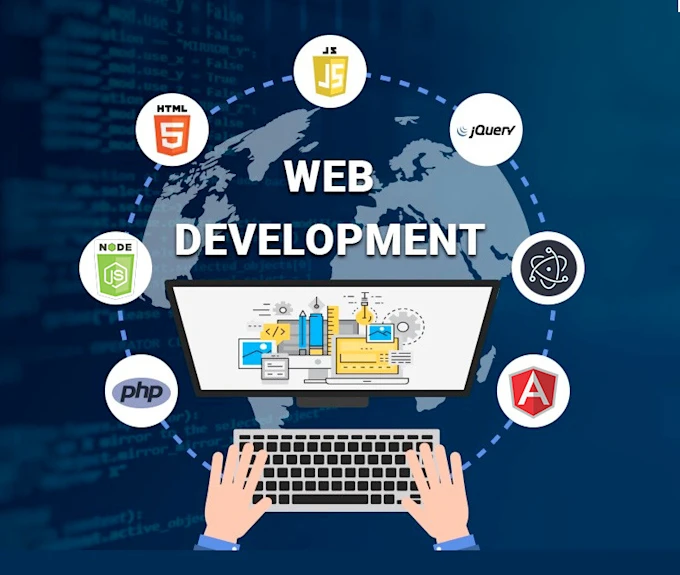
Introduction to Web Development in 2025
Web development isn’t what it used to be. Gone are the days when a simple HTML page with a few images could do the trick. Today, web development has evolved into a powerful ecosystem that drives businesses forward. From eCommerce platforms like Shopify to custom software and mobile app development, it’s the backbone of how companies interact with customers online.
Think about it—when you visit a website, what’s the first thing you notice? Speed, design, or how easily you can find what you need? All of these come together through web development. In 2025 and beyond, businesses that fail to keep up with new trends risk falling behind competitors who leverage technology for growth.
So, let’s dive into the future of web development and explore the trends every business should keep an eye on.
Why Web Development Matters for Businesses
A website isn’t just a digital business card anymore—it’s a sales engine, a branding tool, and a customer service hub all rolled into one. Here’s why modern businesses should care:
- First impressions count. Studies show that users form an opinion about your brand within seconds of landing on your website. A slow or outdated site? That’s a deal breaker.
- User experience drives sales. The smoother the navigation, the higher the chance visitors will convert into paying customers.
- Web development fuels conversions. Whether it’s Shopify store management, SEO optimization, or app integration, your web presence directly impacts your bottom line.
In short, web development is no longer optional—it’s essential.
Key Trends Shaping the Future of Web Development
Artificial Intelligence and Automation
AI is changing the game in web development. Think of AI-powered chatbots answering customer queries 24/7 or machine learning algorithms recommending products on Shopify stores. This automation doesn’t just save time—it creates a more personalized shopping experience.
For example, businesses using Shopify inventory tracking can now integrate AI to predict demand, avoid stockouts, and streamline operations. Imagine never running out of your best-selling product again. That’s the power of AI in web development.
Progressive Web Apps (PWAs)
Progressive Web Apps are bridging the gap between websites and mobile apps. They load lightning-fast, work offline, and give users a mobile-app-like experience without needing to install anything.
For eCommerce stores, including those relying on Shopify warehouse management, PWAs mean more conversions, fewer abandoned carts, and happier customers.
Voice Search Optimization
“Hey Siri, find web designers near me.”
That’s how more and more people search online. With smart speakers and voice assistants everywhere, optimizing your site for voice search is no longer optional. Web developers now need to focus on conversational keywords, local SEO, and faster-loading sites.
This trend is also reshaping SEO and digital marketing strategies. Businesses that don’t adapt may struggle to show up in search results.
Motion UI and Advanced Animations
Users today want more than static pages—they want experiences. Motion UI brings websites to life with subtle animations, transitions, and interactive designs.
For example, a front end developer might use animation to guide a visitor’s eyes toward a “Buy Now” button. It’s not just about looking pretty—it’s about making the website more intuitive and engaging.
Cybersecurity in Web Development
The more advanced web development becomes, the bigger the risks. Hackers target everything from small WordPress sites to massive eCommerce platforms. That’s why cybersecurity is no longer a back-end afterthought—it’s part of development from day one.
This is where managed IT services for small businesses come into play. By integrating IT solutions directly into websites, businesses can ensure data safety, protect customer trust, and avoid costly breaches.
Shopify and Inventory Management in Web Development
Shopify Store Management for Modern Businesses
Hands down one of the most popular eCommerce platforms in the world. But running a Shopify store is more than just uploading products. From inventory control to customer experience, Shopify store management is a key part of modern web development.
Best Shopify Inventory Management Tools
Here’s where it gets interesting:
- Shopify Plus inventory management allows scaling businesses to handle thousands of SKUs effortlessly.
- Shopify for inventory management ensures stores never oversell or undersell.
- Shopify stock management automates reordering, saving business owners countless headaches.
When combined with advanced web development, Shopify becomes a powerhouse for online retailers.
How Web Development Integrates with Shopify Management
Think of your Shopify store as a car. Web development is the engine, while inventory management is the fuel. Without both working together, you won’t get far.
For example, when a customer places an order, the website must immediately update inventory levels, trigger fulfillment, and notify the buyer. This seamless process is only possible when web development is tightly integrated with Shopify warehouse management.
The Role of Web Design in Business Growth
Finding Web Designers Near Me
Sometimes, local matters. Many businesses search for “website developers near me” or “web designers near me” to get personalized service. Local agencies often understand regional markets better, making them a great choice for businesses targeting specific areas.
WordPress Website Designer vs Custom Development
Not every business needs a custom-coded website. For smaller companies, hiring a WordPress website designer might be the most cost-effective option. WordPress offers flexibility, plugins, and fast setup.
On the other hand, businesses needing advanced functionality often turn to custom software development companies. These firms build tailored solutions that grow with the business.
SEO and Digital Marketing in Web Development
Why SEO Optimization Is Crucial
Even the most beautiful website is useless if no one can find it. That’s why SEO optimization is critical in web development. From clean coding to mobile responsiveness, development choices directly influence rankings.
On-page SEO, local SEO, and technical SEO all play a role. Whether you’re working with the best SEO companies or a local SEO agency, you can’t afford to ignore search engines.
Choosing the Best SEO Companies or Local SEO Agency
The market is full of agencies promising the moon. But how do you pick? Look for:
- Proven case studies
- Experience in your industry
- Transparent SEO marketing consultants
The best local SEO company will not just boost rankings but also drive actual sales.
Software Development and App Development
The Rise of Custom Software Development
More businesses are moving away from “one-size-fits-all” software. Instead, they’re turning to custom software development companies that build solutions tailored to their unique needs.
From software development companies near me to global agencies, the demand is booming. Why? Because custom software ensures scalability and flexibility.
Mobile App Development and Web Integration
Websites alone are no longer enough. Businesses are investing heavily in mobile app development to stay connected with customers.
Whether you hire app developers near me or a mobile app development company, the integration between web and mobile platforms is crucial. Modern customers expect seamless experiences across devices.
The Future of Web Development Companies
What to Expect from Website Development Companies
Tomorrow’s web development company won’t just build websites. They’ll offer full-service solutions, including:
- SEO and digital marketing
- IT solutions for small business
- Custom app development
- Shopify store management
The Blending of IT Solutions and Web Development
Web development is no longer just about code. It’s about creating ecosystems that include managed IT services, cybersecurity, software integration, and digital marketing strategies.
Businesses that partner with all-in-one agencies position themselves for long-term success.
Tables for Quick Insight
Table 1 – Major Web Development Trends
| Trend | Impact on Business | Importance |
|---|---|---|
| AI Integration | Personalization & automation | High |
| PWAs | Faster, mobile-friendly websites | Very High |
| Voice Search | Better SEO ranking | Medium |
| Cybersecurity | Protects user data | Critical |
Table 2 – Shopify and Web Development Services
| Service | Benefits | Who Needs It |
|---|---|---|
| Shopify Inventory Tracking | Prevents stock-outs | eCommerce businesses |
| Shopify Plus Management | Scalable inventory control | Growing stores |
| SEO Optimization | Better Google ranking | All businesses |
| Custom App Development | Unique brand apps | Enterprises |
Conclusion
The future of web development is fast, smart, and integrated. From AI-driven Shopify store management to advanced app development, businesses must embrace these trends to stay competitive. A well-developed website isn’t just a digital presence—it’s the foundation of growth, sales, and long-term success.
If you’re looking to stay ahead, invest in web development, prioritize SEO, and leverage custom solutions tailored to your business. The digital future waits for no one—are you ready?
FAQs
1. What’s the most important web development trend for small businesses?
For small businesses, AI integration and SEO optimization are game changers because they directly impact visibility and customer engagement.
2. How does Shopify help with inventory management?
Shopify offers built-in tools for inventory tracking, stock management, and even warehouse management to prevent overselling or stockouts.
3. Is WordPress still good for website development?
Yes, WordPress remains one of the most flexible and affordable platforms for small to mid-sized businesses.
4. Should I hire a local SEO agency or a global one?
It depends on your goals. A local SEO agency is great for targeting specific regions, while global agencies are better for scaling internationally.
5. What’s the future of app development in business?
Mobile apps will continue to grow in importance, with businesses investing in seamless integration between apps and websites for better customer experiences.
